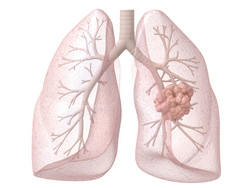New therapies for non-small cell lung cancer
Nearly 10-30 % of NSCLC patients harbour mutations in the EGFR receptor in the KRAS oncogene. As a result, targeted therapy using the EGFR inhibitor erlotinib is an attractive therapeutic alternative to standard chemotherapy. However, these patients develop resistance to the drug, hampering its effectiveness. With this in mind, scientists on the EU-funded project LUNGTARGET (New approaches for the targeted therapy of non-small cell lung cancer) set out to discover novel therapeutic targets for NSCLC patients with EGFR or KRAS mutations. Towards this goal, they employed a variety of approaches, including screening by RNA interference and protein expression profiling. Their efforts led to the identification of several targets, namely the GATA2 transcriptional network and several kinases that are overexpressed and overactive in NSCLC. In addition, they detected differential expression of certain molecules in EGFR-resistant cancer cells, which correlated with patient clinical parameters such as survival and response to therapy. The therapeutic validity of these targets was verified in vivo and a number of combinatorial therapies were proposed to eradicate lung cancer cells with KRAS or EGFR mutations. In answer to erlotinib resistance, the consortium proposed the use of antibodies that target the entire EGFR family. Additional targeting molecules or inhibitors were developed, which alongside novel synergistic therapies open new roads for the treatment of NSCLC. Overall, the therapeutic strategies designed during the LUNGTARGET project constitute the first targeted approach for treating KRAS-mutant NSCLC. The delineation of the mechanisms and the molecular factors associated with therapy resistance will also help to reduce the high mortality rates encountered in lung cancer.







